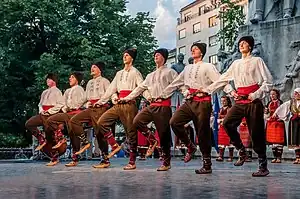бейеү
Bashkir

Ирҙәр бейей.
Men are dancing.
Men are dancing.
Etymology
From Proto-Turkic *büdi- (“to dance”)[1].
Cognate with Old Uyghur [script needed] (büdi-, “to dance”)[2]; Tatar биергә (biyergä, “to dance”), Nogai биюв (biyuv, “to dance”), Kumyk бийимек (biyimek, “to dance”), Yakut битий (bitiy, “to dance at one place”).
Verb
бейеү • (beyew) (intransitive)
- to dance
- Был көй ғәҙәттә ирҙәр бейегәндә уйнала.
- Bïl köy ğäðättä irðär beyegändä uynala.
- This tune is usually played when men dance.
Declension
Inflection of бейеү (beyew)
| singular | plural | |
|---|---|---|
| absolute | бейеү (beyew) | бейеүҙәр (beyewðär) |
| definite genitive | бейеүҙең (beyewðeñ) | бейеүҙәрҙең (beyewðärðeñ) |
| dative | бейеүгә (beyewgä) | бейеүҙәргә (beyewðärgä) |
| definite accusative | бейеүҙе (beyewðe) | бейеүҙәрҙе (beyewðärðe) |
| locative | бейеүҙә (beyewðä) | бейеүҙәрҙә (beyewðärðä) |
| ablative | бейеүҙән (beyewðän) | бейеүҙәрҙән (beyewðärðän) |
Derived terms
- бейеүсе (beyewse, “dancer”)
References
- Starostin, Sergei; Dybo, Anna; Mudrak, Oleg (2003) , “*büdi-”, in Etymological dictionary of the Altaic languages (Handbuch der Orientalistik; VIII.8), Leiden, New York, Köln: E.J. Brill
- Nadeljajev, V. M.; Nasilov, D. M.; Tenišev, E. R.; Ščerbak, A. M., editors (1969) Drevnetjurkskij slovarʹ [Dictionary of Old Turkic] (in Russian), Leningrad: USSR Academy of Sciences, Nauka, page 131
This article is issued from Wiktionary. The text is licensed under Creative Commons - Attribution - Sharealike. Additional terms may apply for the media files.